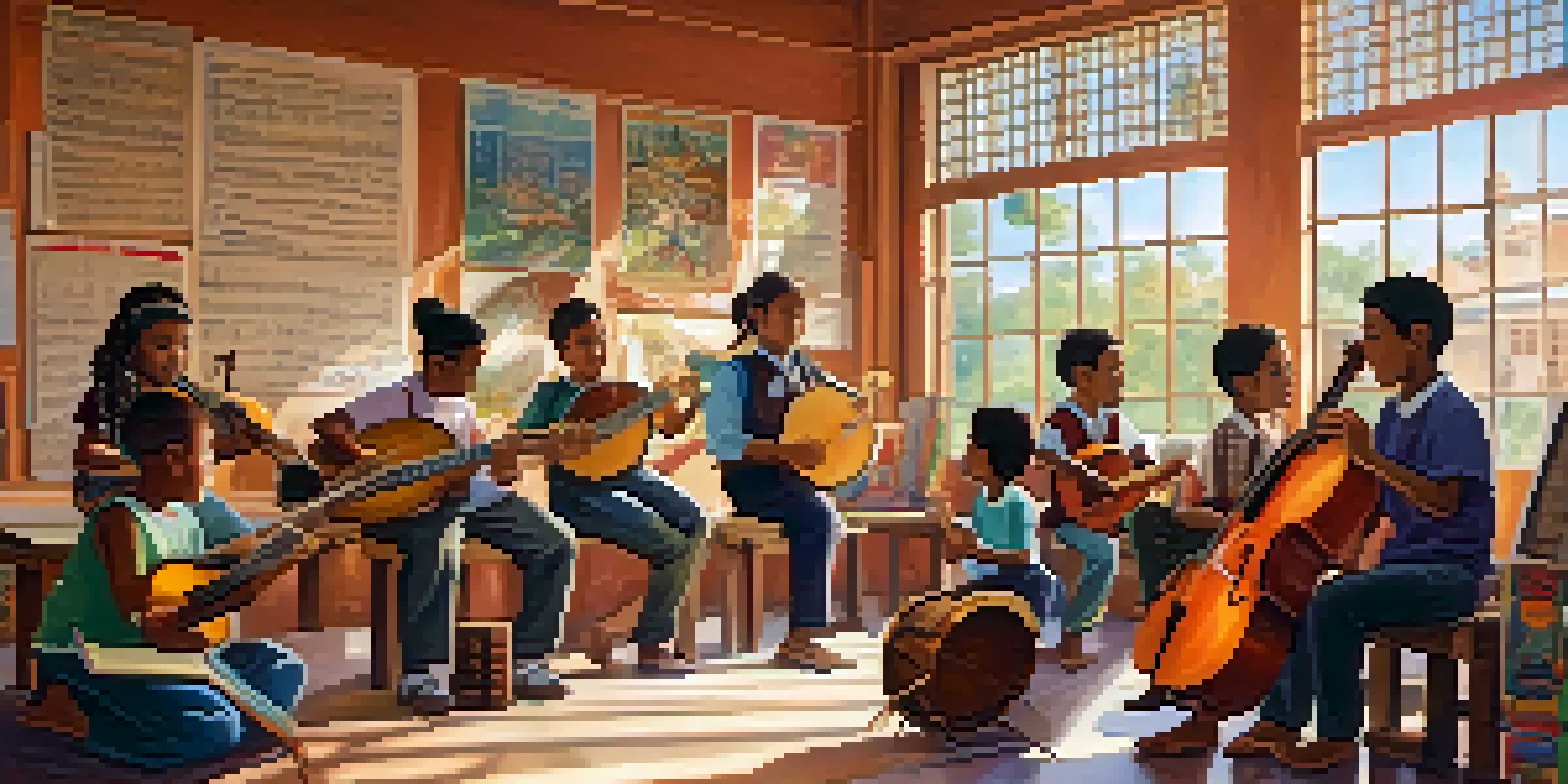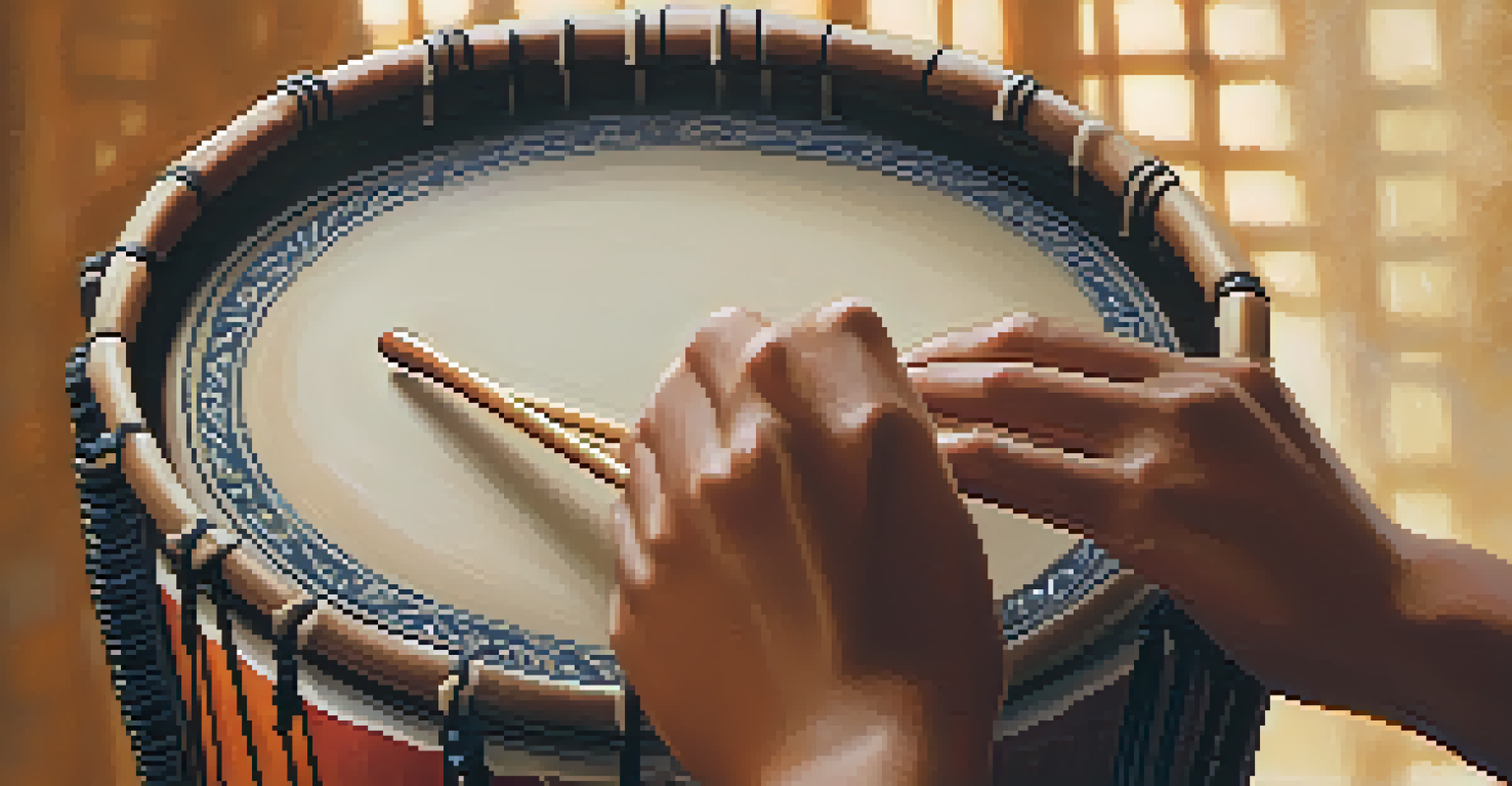The Importance of Music Education in Developing Cultural Awareness

Music Education: A Gateway to Cultural Understanding
Music education plays a vital role in introducing students to diverse cultures. By studying various musical styles, students can appreciate the histories and traditions behind them. For instance, learning about African drumming not only teaches rhythm but also sheds light on its cultural significance.
Music can change the world because it can change people.
Through music, learners can explore the nuances of different societies, helping to break down stereotypes and build empathy. This understanding encourages students to celebrate differences rather than fear them. In essence, music becomes a powerful tool for connection and dialogue.
Furthermore, music education encourages collaboration among students from different backgrounds. Working together on musical projects fosters teamwork and respect for one another's cultural heritages, enriching the educational experience.
Building Empathy Through Musical Experiences
Engaging with music from various cultures can nurture empathy among students. When learners immerse themselves in the sounds and stories of different traditions, they begin to relate to the emotions and experiences of others. This emotional connection is crucial for developing a more compassionate worldview.

For example, studying the struggles depicted in folk music can help students understand the historical contexts that shape those narratives. As they explore these stories, learners cultivate a sense of shared humanity, fostering deeper connections across cultural divides.
Music Fosters Cultural Understanding
Music education introduces students to diverse cultures, helping them appreciate the traditions and histories behind various musical styles.
Moreover, participating in music from different cultures allows students to express their own identities while respecting others. This duality helps them appreciate diversity, encouraging a harmonious environment where everyone’s voice matters.
Enhancing Critical Thinking Through Cultural Music Analysis
Analyzing music from different cultures enhances critical thinking skills by requiring students to interpret and evaluate various elements. Understanding how musical components reflect cultural values encourages deeper cognitive processes. Students learn to ask thoughtful questions about why certain musical choices resonate within a culture.
The music is not in the notes, but in the silence between.
For instance, comparing the improvisational nature of jazz to the structured melodies of classical music can reveal differing cultural priorities. This analytical approach equips students with the tools to engage with complex ideas and think critically about societal issues.
By fostering these skills, music education empowers students to become informed global citizens. They learn to appreciate not just the music itself but also the cultural narratives that shape it, enriching their overall educational experience.
Promoting Inclusivity Through Diverse Musical Genres
Incorporating a variety of musical genres into education promotes inclusivity and respect for all cultures. When students are exposed to a broad spectrum of music, they see the value in diverse artistic expressions. This exposure helps to create an environment where all students feel seen and valued.
For example, integrating world music into the curriculum can spark students' interest in learning about various cultural practices and traditions. This not only broadens their musical horizons but also fosters a sense of belonging among all students, regardless of their background.
Empathy Through Musical Engagement
Engaging with music from different cultures nurtures empathy, allowing students to connect emotionally with the experiences of others.
Additionally, celebrating diverse musical traditions during school events or performances can strengthen community ties. These activities encourage students to share their cultural heritage while learning from their peers, cultivating a spirit of unity.
Music Education as a Tool for Global Citizenship
Music education equips students with the skills to become informed global citizens. By learning about music from different cultures, students gain insights into global issues, values, and traditions. This understanding is essential in today’s interconnected world.
For instance, studying protest songs from various movements can inspire students to think critically about social justice and activism. They learn that music can be a powerful form of expression and a catalyst for change, encouraging them to engage with the world around them.
Furthermore, as students explore global musical traditions, they develop a sense of responsibility towards fostering intercultural dialogue. This awareness encourages them to become advocates for diversity, equity, and inclusion in their communities.
Fostering Creativity Through Cultural Music Exploration
Exploring different musical cultures nurtures creativity in students. When learners encounter various musical styles and techniques, they are inspired to experiment with their own artistic expressions. This creative exploration can lead to innovative thinking and problem-solving skills.
For example, blending elements from traditional and contemporary music can result in unique compositions that reflect students' diverse backgrounds. This process not only enhances their musical skills but also allows them to create something new, celebrating their individuality.
Creativity in Cultural Exploration
Exploring diverse musical genres inspires creativity in students, encouraging them to innovate and express their unique identities.
Moreover, fostering creativity through music education encourages students to express themselves confidently. This self-expression is essential for personal growth and can lead to greater engagement in other areas of learning.
The Role of Music Educators in Cultural Awareness
Music educators play a crucial role in cultivating cultural awareness among students. By selecting diverse musical repertoires and teaching cultural contexts, they help students appreciate the richness of global music. Their guidance is essential in fostering an inclusive and respectful learning environment.
Educators can also serve as cultural ambassadors, sharing their knowledge and experiences to deepen students' understanding. Their passion for music and cultural appreciation can inspire students to explore beyond the classroom, fostering a lifelong love for learning.

Ultimately, music educators are key to shaping the next generation of culturally aware individuals. Through their efforts, they empower students to embrace diversity, making the world a more harmonious place.